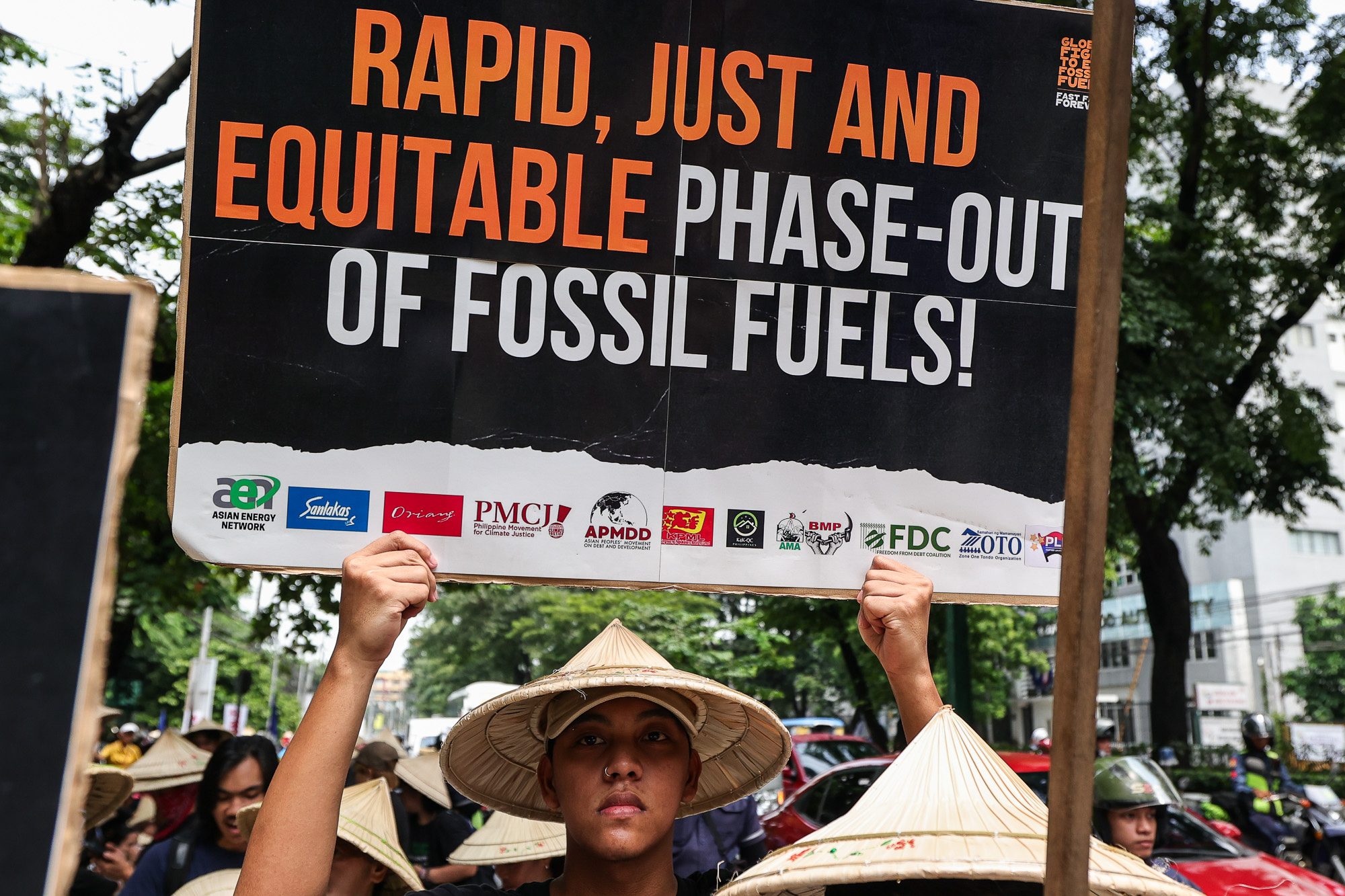SUMMARY
This is AI generated summarization, which may have errors. For context, always refer to the full article.

MANILA, Philippines – Who gets to phase out fossil fuels is a matter of who has the money to transition to renewable energy.
The final text from this year’s United Nations Climate Change Conference (COP28) called to transition away from fossil fuels instead of phasing out.
The “watered-down” language was highly contested. But for Environment Secretary Toni Yulo-Loyzaga, this was the best the world could get given the circumstances in COP28 and the Philippines’ financial capability.
“We all want a phaseout,” Loyzaga told reporters on Monday, December 18. “Given the particular circumstances of this COP…. the wording that was put in there, I think, was the best that could be achieved, otherwise there would be no gavel.”
Did the Loyzaga-led Philippine delegation push for the word phaseout during the negotiations? The environment secretary didn’t answer directly.
Instead, she pointed out the matter of working “with what we have although we would like, aspirationally, to phase out.”
“Policy-wise, a phaseout for us is something we need to afford,” she said. “And so the policy statement has always been phasedown towards phaseout.”
This is a sentiment not unique to the Philippines. Other developing countries also have reservations on backing the call to phase out fossil fuels if funding is not available.
“It’s a matter of facing reality as a developing country,” Loyzaga said. “What we can afford to advocate and what will apply to us is something that we need to face as a reality in terms of our own needs as a country.”
By 2040, the government seeks to increase renewable sources to half of the country’s energy mix.
“In all of these, adequate and timely access to climate financing is crucial for the Philippines to equitably and effectively pursue its energy transition,” the Department of Energy (DOE) said in a statement last December 5.
At COP28, countries pledged to triple renewable energy capacity and double energy efficiency improvements by 2030. To do this, it would take $1.2 trillion worth of investments on renewables annually, according to the International Energy Agency.
See you next COP?
Many civil society groups and vulnerable nations have been pushing to use the term “phaseout” in the final text of past summits.
Why does this matter?
Phaseout would mean a radical cutting down of greenhouse gas emissions and the burning of fossil fuels. The weaker version is to phase down which could enable delay. The final text at COP28 used “transitioning away,” criticized for its recognition of transitional fuels.
Avril de Torres, deputy executive director of think tank Center for Energy, Ecology, and Development, said the COP presidency didn’t use “phaseout of fossil fuels” even though it was one of the options.
“For those who have been following the COP negotiations for years, we know that we have been trying to insert full, funded, fair, feminist phaseout of fossil fuels in the text,” De Torres said in an episode of The Green Report.
“And in the building blocks of the Global Stocktake text, we actually saw one of the options there state ‘phaseout of fossil fuels.’”
De Torres, who was among the representatives of Philippine civil society groups in Dubai, concurred with the opinion that the choice of COP28 venue and president largely influenced the final text.
The annual climate summit was headed this year by state oil chief Sultan Al-Jaber.
The environment chief herself admitted that the language is still wanting.
“I think, at this point, we need to work for better wording and that has to happen [in the] next COP,” she said.
Loyzaga explained that in summits like COP28, parties are bound to submit to some compromises.
Despite the challenges, she hailed the negotiators from the Philippine delegation who she said were able to “make headway” and “get our wording in.”
“When we come to these types of conferences, you work with what you have. And you make the best of what you can. That’s the way it works. We’ve had some really good negotiators,” she said.
One of the Philippines’ wins in the recently concluded summit was clinching a seat on the board of the loss and damage fund, along with other selected countries.
The seat would signal the country’s influence over who gets (and how fast they would get) financing to recover from losses exacerbated by climate change. – Rappler.com
Add a comment
How does this make you feel?
![[OPINION] Making a case for 100% renewable energy: The 1.5°C goal in the PH power sector](https://www.rappler.com/tachyon/2023/12/tl-1.5C-goal.jpg?fit=449%2C449)













![[ANALYSIS] Why do we pay higher power rates when we have power outages?](https://www.rappler.com/tachyon/2024/07/tl-higher-power-rates-higher-power-outages.jpg?resize=257%2C257&crop=401px%2C0px%2C1080px%2C1080px)





There are no comments yet. Add your comment to start the conversation.